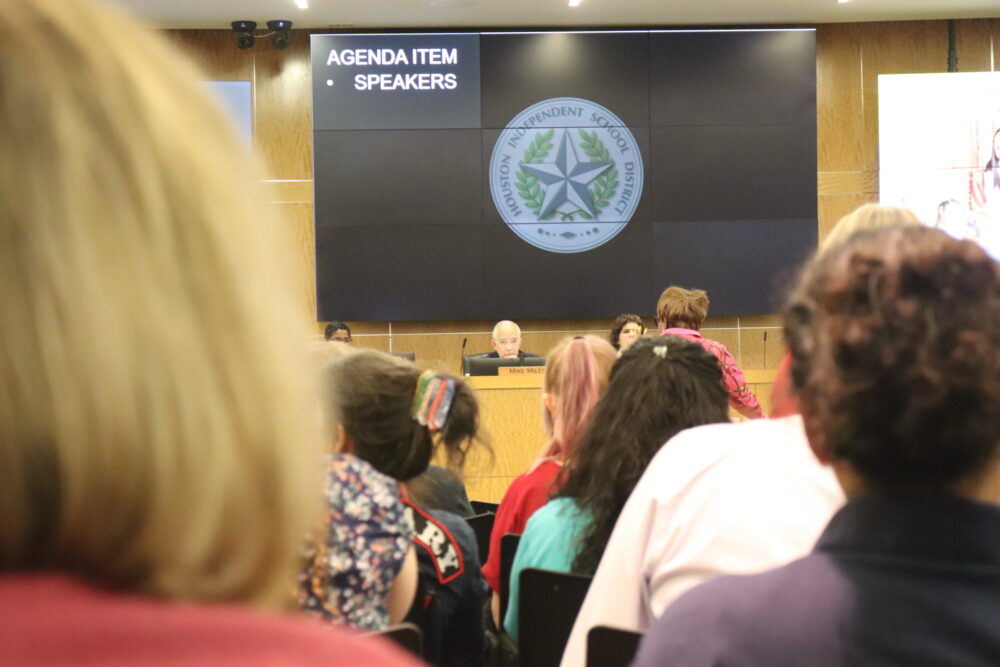
At the monthly school board meeting on Thursday, the 10 state appointees who lead Houston ISD faced nearly 150 members of the public — each limited to one-minute comments, delivered over the course of about three hours.
The message was almost universal, and it appears to have resonated with the state-appointed leaders to some degree.
Parent Jeffrey Fox boiled it down when he said, "Members of the board, reject this system and reject this superintendent."
Fox was referring to a controversial performance evaluation system for principals. It relies heavily on test scores and classroom observations to evaluate the quality of campus leaders.
Earlier this year, a "mid-year screening" found nearly half of HISD principals fell short of proficiency. 117 were warned to improve their performance or risk removal, though Miles emphasized he expected the "overwhelming majority" of campus leaders to return. An unspecified number were told, based on the screening results, that they would definitely not be able to return.
MORE: Dominic Anthony Walsh discusses this story on Houston Matters
Listen
Long after public comment ended, the board went into an hours-long closed session, emerging after 2 a.m. Upon their return, Miles read a brief statement.
"The proficiency screener rating will not be used in the evaluation of principals or other campus administrators in any adverse employment decisions for 2023-2024," Miles said. "The superintendent will continue to use instructional data and student achievement data in the exercise of the discretion outlined in board policy ... part of which reads ‘when relevant to the decision, written evaluations of a professional employees performance ... and any other information the administration determines to be appropriate shall be considered in decisions affecting contract status.' This communication supersedes any prior communications regarding the same."
In other words, the administration will proceed with the controversial pay-for-performance evaluation system for principals. But, according to Miles, the mid-year screening that threatened many campus leaders' jobs will not have an effect on the final outcome.
It's a stark change of course. While it’s unclear what was discussed in the closed session, the leaders emerged with Miles apparently having changed his mind.
In a meeting with campus leaders earlier this month about the mid-year screening, Miles told them to not go outside the “chain of decision-making.”
“There is no input that I will listen to with regard to instructional values and how principals are scored and evaluated,” Miles told them. “That is up to me and the division (superintendents) and our executive directors. If you think you can go outside that chain of decision-making, you’re wrong. Stop.”
"That will have no impact on me," he continued. Does anybody believe that I will not be here next year? You cannot wait it out.”
In a press conference on Monday, Miles defended the now-reversed mid-year screenings, comparing the process to a middle-of-the-season check-in with a football coach.
"I already told you 80% or 90% of (campus leaders) will have a winning season, or at least be brought back, and of those schools, some specific (high-achieving) schools that you’re talking about, I think for sure they have a winning season," Miles said on Monday.
During a press conference Friday afternoon, Miles said legal concerns did not drive the reversal.
"We found that a good number of members of the community came out, and we wanted to listen to their concerns," Miles told reporters. "And while it took a while to hear all the concerns, there were a number of new voices in the room. And just like always, we take every comment seriously. We were listening, and so the board and I made some adjustments, and we listened to what we heard last night."
He didn't directly answer a question about how much of the decision was driven by the state-appointed board.
"The board and I both together, listened to comments from the community, and we came up with, we think, a sensible way to move forward and to help communicate and also to clarify," Mile said. "The board has a big role in responding to the community, and we work as a team of 10 to make sure that we’re responding in a way that makes sense."
The principal evaluation system had become a source of widening controversy. Community members who previously supported or, at least, did not publicly criticize the reforms became vocal when they found the names of 117 campus leaders from some of the district's top-achieving schools on a list first published by the Houston Chronicle. Many students and parents from the Houston metro area's top-ranked school, Carnegie Vanguard High, for the first time publicly criticized Miles at the meeting, after they discovered the school's well-liked, long-serving principal on the list.
Naomi Doyle-Madrid, an HISD parent and board-appointed member of the District Advisory Committee, described feeling "high hopes" in June that Miles would help "children and families who for decades had been denied a high-quality education and resources."
Doyle-Madrid described Miles' approach to evaluating principal performance as a "potentially illegal proficiency screening tool ... that not only evolves as the evaluation tool is utilized, but has led our very best high school principals to find themselves on a list."
State Representative Jarvis Johnson told the board managers and Miles that he believed "each and every one of you would be fired" if subjected to a similar evaluation system.
Some community members called for a wider sense of solidarity, nudging parents from top-achieving schools to push back on the New Education System reform program. The controversial NES reforms are intended to turn around schools that have struggled with state academic standards. By August, the program will cover nearly half the district.
Melissa Yarborough resigned from her position as an HISD teacher in January, pointing to pressure from administrators to only use the district's centrally created curriculum despite working at a non-NES school. She also has children at Pugh Elementary, which was swept up by the NES program this school year and has since experienced high teacher turnover and an influx of non-certified educators.
"If you wouldn’t allow this to happen to your children, then don’t allow it to happen to mine or anyone else," Yarborough said.
Earlier in the day, protesters gathered outside the annual State of the District event. Inside, a handful disrupted Miles' speech before being removed by security.
Some community members tried to rally the widespread outrage into a campaign for Miles' removal. Their strategy was simple, with potentially massive ramifications: withhold a potential multi-billion-dollar bond package for much-needed school renovations and safety unless Miles is forced out and his evaluation system is reversed. It's unclear how much strength that campaign could muster, especially now that the board has taken some action in apparent response to community outrage.
The district faces a looming budget crunch. Miles said this week that some schools will face funding slashes of up to 12% next year due to declining enrollment and the looming fiscal cliff as federal COVID relief dollars expire. The cuts are similar to ones proposed by the prior administration last year but ultimately clawed back by the elected trustees prior to the takeover.
Miles has not said which schools will face cuts. Budgeting sessions are expected to begin later in the spring, and the board has until the end of June to approve the budget for next school year.

 86 °F
86 °F